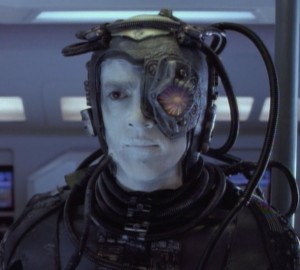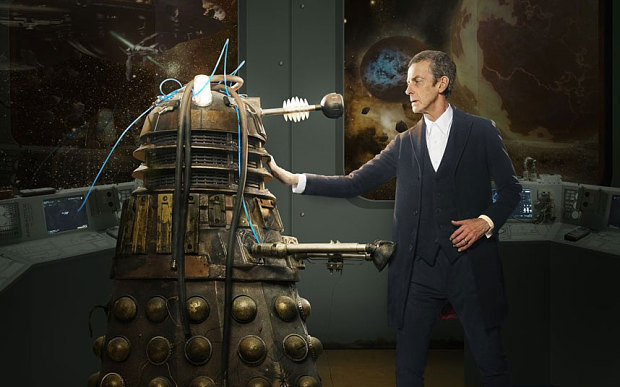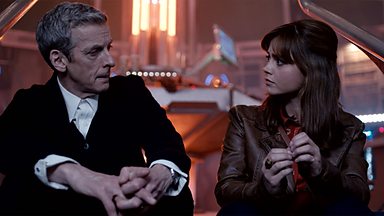What do you think of the opening title sequence Doctor Who is using? The grinding gears, the spiraling Roman numerals, the fly-by of Peter Capaldi’s mysterious eyes, the piercing electronic whine… It all creates an alien, unnerving, cold atmosphere. I don’t know whether this sequence will become one of my favorites (it was inspired by a fan’s creation, so that’s cool), but I do think it suggests important aspects of Capaldi’s Doctor. As “Into the Dalek” demonstrates, our favorite Time Lord, for all that he looks human, is alien, fully capable of being unnerving and cold.
“A Good Dalek”
I felt unnerved watching the Doctor sacrifice Ross (Ben Crompton) to the Dalek antibodies. “Trust me,” he tells the frightened soldier. Whenever spoken by David Tennant’s or Matt Smith’s Doctors, that phrase usually preceded the production of some near-miraculous ace from the Doctor’s sleeve.
Not now. The Doctor wrings an advantage from Ross’ death only by deciding Ross was “already dead” from the moment he shot his grappling hook down “Rusty” the Dalek’s gullet. It’s a Machiavellian moment, jarring for a character who professed only last week that human beings are “never small” to him. Had the Doctor told Ross the truth, had he called on him to make his death a conscious, willing contribution to the mission’s success—as Gretchen Allison Carlisle (Laura Dos Santos) bravely does, minutes later—he could have honored Ross. Instead, he treats him as someone whose death can be dismissed with a crack about “saying a few words” over the top layer of goo in Rusty’s gut. Journey Blue (Zawe Ashton) is right to demand better, and the Doctor is right to step back as he realizes Gretchen’s noble intent. Throughout this episode the Doctor paints soldiers with a broad, disparaging brush (has he forgotten the Brigadier?), but the crew of the Aristotle strike me as women and men of whom the Doctor is not worthy.
The Doctor’s betrayal of Ross’ trust advances the episode’s thesis: The Doctor is, in important ways, little different from his enemies. It’s not a ground-breaking idea. In 2005’s “Dalek,” Christopher Eccleston’s Doctor was told, “You would make a good Dalek.” Even so, Rusty’s blunt assertion of the point, no longer hypothetical—“You are a good Dalek”—is riveting. When we see the Doctor from Rusty’s point of view, bathed in the baleful blue light of the Dalek’s eyestalk, his gaunt features appearing as though carved from ice, we’re forced to ask, “Can we admire and cheer for a man like this, capable of such coldness?” His subsequent spurning of Journey as a potential companion, even after acknowledging her kindness and bravery, only reinforces that the Doctor can be as cruel as his foes.
“Something Amazing”?
This episode tells us about the Doctor’s hatred of Daleks. It does a better job showing a different trait: his arrogance. The Doctor decides it is too light a thing that he make Rusty good again. He sets out to make all Daleks good.
 “Into the Dalek” reminded me of “I, Borg,” one of Star Trek: The Next Generation’s standout episodes. The Enterprise crew’s plan to introduce individuality into the Borg Collective was audacious, but also modest. Captain Picard didn’t claim to know exactly what would happen if he sent one drone with fledgling free will and independent thought back to the hive mind, but he hoped for the best: “The knowledge of self being spread throughout the Collective… might alter them forever.” He even made sure the drone, Hugh, participated willingly. It was a high-stakes plan, pursued with caution and humility, staying true to Starfleet and the Federation’s values and ideals.
“Into the Dalek” reminded me of “I, Borg,” one of Star Trek: The Next Generation’s standout episodes. The Enterprise crew’s plan to introduce individuality into the Borg Collective was audacious, but also modest. Captain Picard didn’t claim to know exactly what would happen if he sent one drone with fledgling free will and independent thought back to the hive mind, but he hoped for the best: “The knowledge of self being spread throughout the Collective… might alter them forever.” He even made sure the drone, Hugh, participated willingly. It was a high-stakes plan, pursued with caution and humility, staying true to Starfleet and the Federation’s values and ideals.
In contrast, the Doctor pursues his high-stakes plan recklessly. He forces his way into Rusty’s mind to harangue him about the beauty of the cosmos and the inevitability of universal rebirth, so confident that, as he promised Gretchen, he’s doing “something amazing.” He declares, “I can save the future!” His intent may be noble (though I’m unsure), but his plan is staggeringly arrogant. It’s full of hubris worthy of the “Time Lord Triumphant” who supposedly learned better in “The Waters of Mars.” Instead of saving the future, the Doctor provokes more death and destruction in the present. He identifies himself as standing against all the Daleks stand for—“The Doctor is not the Daleks!”—but his actions reveal an uglier truth.
No Easy Answers
I enjoyed “Into the Dalek.” I appreciated the spectacular special effects. I welcomed Clara’s importance as an active problem-solver and the Doctor’s much-needed conscience (as he flippantly admits, “She cares so I don’t have to”). I’m intrigued by Danny Pink (Samuel Anderson), a former soldier who, like Journey, gives the lie to the Doctor’s prejudice against members of the military.
And I found the episode a powerful parable about the corrupting nature of hate and pride. “Hatred stirs up strife,” ancient Israel’s sages cautioned (Proverbs 10.12). God calls us to rid ourselves of it. God’s Law commands, “You shall not hate in your heart anyone of your kin… You shall not take vengeance or bear a grudge against any of your people, but you shall love your neighbor as yourself” (Leviticus 19.17-18). Jesus reiterates the commandment to love, and makes clear how expansive God’s definition of “neighbor” is: “You have heard that it was said, ‘You shall love your neighbor and hate your enemy.’ But I say to you, Love your enemies…” (Matthew 5.43-44). The Holy Spirit seeks to root hatred from our heart because it poisons us. It keeps us from growing into the image of Christ; instead, as the Doctor finds (again), it twists us into the image of what and who we say we oppose.
These truths demand attention from us as individuals and as a society. As our nation weighs possible responses to our enemies, will we meet hate with hate? Will we undertake action that claims moral high ground but may be reckless and arrogant, threatening to turn us into what we claim we oppose? Or will we find ways to act that stay true to our highest values and ideals, so that our deeds as well as our words say, “We are not you?”
I don’t have easy answers for these questions, any more than Clara did for the Doctor’s question, “Am I a good man?” Like her, I’m not sure I know who this man is—and, were this episode my only exposure to him, I’m not sure I’d second her charitable conclusion that he tries to be.
Scripture quotations are from the New Revised Standard Version.



The doctor has been like this before. It’s part of his personality that is hidden or lesser in some regenerations, and one that comes out more fully in others. He fights it. Regeneration is like shaking a snowglobe- the same snow is always in the globe, but it arranges itself in different patterns- sometimes a flat layer, sometimes hilly areas, sometime it covers the little figurines completely. It can looks like a whole different landscape but it’s the same snow– the doctor has his qualities, they just ‘land’ differently when he’s shaken up. Even “the warrior” just drew out parts that were there– and suppressed others. When we saw this Warrior in “Day of the Doctor” he was still very much the doctor. I’m seeing this is Capaldi’s doc as well.
Thanks for reading and commenting, Elmtree. I like your snowglobe analogy! I am a bit surprised the creative team is choosing to emphasize the darker elements of the Doctor right now, when Capaldi’s casting is generating lots of attention for the show and (hopefully) pulling in a lot of new viewers. I fear a dark Doctor, while ok in the long run for longer-term viewers, may be off-putting to folks who may be thinking, “I’m supposed to pull for *this* guy?!?” Also because, as you allude to, we just got through with a bunch of dark Doctor stuff re: the Time War and the War Doctor.
On the other hand, better to deal with the darkness at the start of his run than as it wears on, perhaps! The creative team have set themselves a challenge.
Great poits all around. This season seems to be setting up for self-realization and hopefully redemption for the Doctor. Btw, bravo for bringing up Hugh, from “I, Borg.” The. Blond and I were watching and she leaned over and said, “Didn’t we already see this episode on STNG?”
“Good points,” not “poits.” Stupid iPad.
Allan – Great minds think alike, eh? Thanks for reading and commenting. I think “Robot of Sherwood” bears out our hope that the Doctor, despite himself, is going to become (to quote from that other wonderful Moffat show, “Sherlock”), not only a great man, but also a good one. Mostly. Eventually. Maybe. 🙂